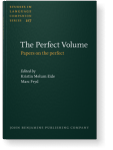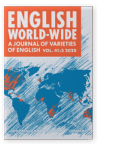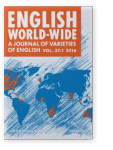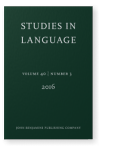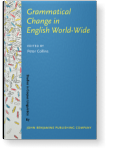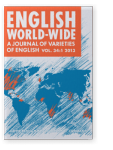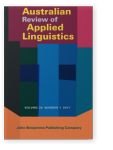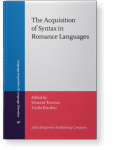Celeste Rodríguez Louro
List of John Benjamins publications for which Celeste Rodríguez Louro plays a role.
2021 Chapter 10. Gauging expansion in synchrony: The periphrastic perfect in nineteen century Rioplatense Spanish The Perfect Volume: Papers on the perfect, Eide, Kristin Melum and Marc Fryd (eds.), pp. 241–258 | Chapter
One of the hallmarks of present-day Rioplatense Spanish is the highly specialised use of the periphrastic perfect or Pretérito Perfecto Compuesto (PPC). Most perfect nuances are instead encoded in this dialect through the synthetic past or Pretérito Perfecto Simple (PPS). Exploration of a novel… read more
2020 Another story: Be like across discourse types English World-Wide 41:3, pp. 325–351 | Article
Quotative be like has been described as “one of the most striking developments [in English]” (Tagliamonte and D’Arcy 2004: 493). Despite the vast research on quotatives and the upsurge of be like, the potential impact of discourse type on the grammar of quotation has rarely been assessed. Yet,… read more
2016 Review of Buchstaller (2014): Quotatives: New Trends and Sociolinguistic Implications English World-Wide 37:1, pp. 103–108 | Review
2016 Indefinite past reference and the Present Perfect in Argentinian Spanish Studies in Language 40:3, pp. 622–647 | Article
The last decade has witnessed a flurry of research into variation in the use of the Pretérito Perfecto Compuesto (PPC) and the Pretérito Perfecto Simple (PPS). Researchers have posited a resemblance between the Argentinian (ARG) and the Mexican PPC in its encoding of durative past situations… read more
2015 The evolution of epistemic marking in West Australian English Grammatical Change in English World-Wide, Collins, Peter (ed.), pp. 205–220 | Article
Across English varieties, frequent subject + epistemic/evidential verb constructions have been reanalysed as formulaic stance markers capable of introducing an embedded clause in the absence of that. I think has grammaticalised further and can occur in a syntactically parenthetical location in an… read more
2013 Quotatives down under: Be like in cross-generational Australian English speech English World-Wide 34:1, pp. 48–76 | Article
The English quotative system (featuring forms such as say, think, zero, go, all and be like used in direct speech reproduction and thought) has been the subject of vigorous, in-depth sociolinguistic investigation, particularly in the past two decades. However, with the notable exception of Winter’s… read more
2006 Beyond the syntax of the Null Subject Parameter: A look at the discourse-pragmatic distribution of null and overt subjects by L2 learners of Spanish The Acquisition of Syntax in Romance Languages, Torrens, Vincent and Linda Escobar (eds.), pp. 401–418 | Article
This study investigates whether and how English-speaking L2 learners at various proficiency levels acquire the morphosyntactic and discourse-pragmatic properties of subject expression in Spanish. The crucial question is whether discourse-pragmatic properties are acquired together with syntactic… read more
